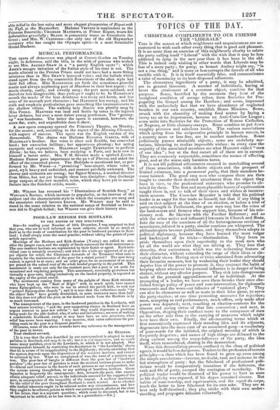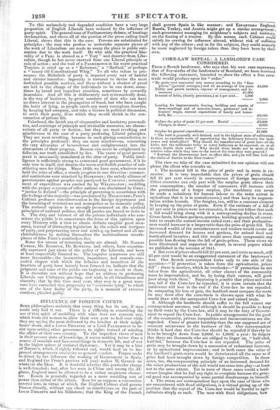TOPICS OF THE DAY.
CHRISTMAS COMPLIMENTS TO OUR FRIENDS THE "LIBERALS."
Tots is the season at which neighbours and acquaintances are ac- customed to wish each other every thing that is good and pleasant. It is no more than an exercise of this neighbourly charity to salute the party calling itself " Liberal" with the wish that it may be less addicted to lying in the new year than it has been in the old. This is indeed only wishing in other words that Liberals may be less of a mere party ; for party, as honest Audrey might say, "is not a true thing," and it more or less corrupts the morals of all who meddle with it. It is in itself essentially false, and communicates a taint of mendacity to its best-disposed adherents.
The elementary ingredients of a party, it may be admitted; are in general innocent. A number of individuals, having at heart the attainment of a common object, combine for that purpose. Some, horrified by the accounts they hear of the benighted condition of savage tribes, form Societies for Pro- pagation' the Gospel among the Heathen ; and some, impressed with the melancholy fact that we have abundance of neglected heathen in our own country, establish Home Missions. Some, struck with the absurdity of making food scarce by laying a heavy tax on its importation, become an Anti-Corn-law League ; some unite into Societies for the Protection of Roman Catholics, or Negroes, or little chimney-sweeps. Some combine to put down naughty pictures and salacious books. The various associations which spring from the cooperative principle in human nature, in a country more or less free, are in number numberless. Some judiciously pursue attainable objects ; some are crotchety sec- tarians, labouring to realize impossible wishes : in every case the majority of the associated members are what IIszurr called "men of one idea "; but at the first outset all of them are in earnest.
They are commonly respectable, sometimes the means of effecting good, and at the worse only harmless bores. It is not till political adventurers succeed in marshalling several of these associations, with definite objects and the prospect of
limited existence, into a permanent party, that their members be- come tainted. The good easy men who compose them are then taught to transfer their devoted attachment from the object they have in view, to the professional statesmen who promise to ob- tain it for them. The first and most plausible lesson of equivocation taught them is, not to talk of their views and wishes at inconve- nient seasons. The Corn-law Repealer is told that his political leader is as eager for free trade as himself, but that if any thing is said on that subject at the time of an election, or before a trial of party-strength in Parliament, the great men may lose the votes of the landowners and farmers who support him, because of his mis- sionary zeal. So likewise with the Further Reformer ; and so with the other active and influential interests in Church and State. .Into the ears of the members of all the heterogeneous sections of associators, lasted in a party, similar cautions are whispered. The philanthropists become politicians, and fancy themselves adepts in political diplomacy, because they have learned the most vulgar and hackneyed of its tricks— dissimulation. They learn to pride themselves upon their superiority to the weak men who let all the world see what they are driving at. They lose that sincerity, that earnestness, which was the redeeming feature of' their character, without extending the range of their ideas or ele- vating their views. Having once or twice abstained from advocating their favourite measure, lest by weakening their leader they should deprive him of the power to promote it, they contract the habit of keeping silent whenever Isis personal influence is in danger of being shaken, without any ulterior purpose. They sink into disingenuous tools of the personal aggrandizement of an individual. At the prompting of a leader, we have seen them forsake their once che- rished foreign policy of peace and non-intervention, for diplomatic tracasserie and the worn-out fallacies of "national glory." They can also be clamorous as well as mute in their false game, to serve the party-tactics ; at one time promoting measures for rejection; anon, accepting as real performances, mock-offers, only made after power was departed; next, vouching at election-contests for the sincere and saving virtue of that late conversion ; and next, in Opposition, shaping their conduct more to the annoyance of men on the other side than to the carrying of measures which might have been their own. Finally, the oft-recurring terms which at first conveniently expressed their standing idea and its adjuncts, degenerate into the mere cant of an associated gang—a vocabulary of pass-words for the initiated, the original meaning of which is frequently forgotten ; and names of high things are debased to the
slang current among the camp-followers of party, the idea itself, when remembered, sharing in the desecration. Were this demoralizing process confined to the class of political
agents, it would be less dangerous. Traders in the profession of certain principles—a class which has been found to grow up even among the simple associations—become, no doubt, rank and noisome in the hot atmosphere of party : but the falsehood of professional poli- ticians would be comparatively innoxious if the followers, the rank and file of party, escaped the contagion of mendacity. The political trader would be disarmed of his power to hurt as soon as his duplicity was exposed, if his dupes remained sincere. But habits of man-worship, and equivocation, and the caps* du corps, teach the latter to love falsehood for its own sake. They are at best only half-deceived ; they play tricks with their own under- standing; and propagate delusion voluntarily.
To this melancholy and degraded condition have a very large proportion of English Liberals been reduced by the influence of party-spirit. The general tone of Parliamentary debate, of hustings declamation, and above all of the portion of the press calling itself Liberal, shows that this is the case. Persons are substituted for principles ; the men who profess to undertake separate pieces of the work of Liberalism are made to usurp the place in public esti- mation due to the work itself. He who aids the practical libe- rality of a PEEL is abused as a " Tory " and deserter from Libe- ralism, though he has never swerved from one Liberal principle or rule of action ; and the tool of a PALMERSTON in his worst practical Toryism is cried up as a " Reformer," a "Radical," or perhaps a " sound old Constitutional Whig." To all who refuse to pro- nounce the Shiboleth of party is imputed every sort of hateful and sinister intention : ingenuity is tortured to devise the most farfetched possible motives, and these without a shadow of proof are laid to the charge of the individuals to be run down, some- times by broad and impudent assertion, sometimes by cowardly inuendoes. And all this is deliberately and systematically done, in the way of business, by great numbers of men who can have no direct interest in the propagation of fraud, but who have caught the habit of lying, as people catch any nasty contagious disorder, by keeping bad company, and take a licence in political discussion, to serve their party, from which they would shrink in the con- versation of private life. Falsehood, the lavish use of vituperative and laudatory personali- ties, and contempt of principle and attainable measures, are charac- reristic of all party or faction ; but they are most revolting and mischievous in the case of a party professing Liberal principles. They are most revolting, because in such glaring contradiction to the principles professed : they are most mischievous, converting the very advocates of benevolence and enlightenment into the obstructers of their progress. Reason can never be enlightened by fallacies, nor truth established by lies. The cause of good govern- ment is necessarily immolated at the altar of party. Public intel- ligence is sufficiently strong to command good government, if it be only true to itself, and despise the mean and foolish practice of sub- stituting men for things. Since 1820, we have seen, whatever men held the reins of office, a steady progress in one direction : commer- cial restrictions were attacked by HUSKISSON ; the unholy alliance of governments against peoples was paralysed by CANNING; retrench- ment of expenditure was carried far by WELLINGTON; meddling with the proper concerns of other nations was disclaimed by GREY; "justice to Ireland"—the principle of governing in accordance with the feelings of the majority—was proclaimed by MELBOURNE; PEEL'S Cabinet professes non-intervention in the foreign department and the loosening of restrictions and monopolies as its domestic policy. The national opinion is so strongly pronounced on the cardinal principles of national politics, that all parties are forced to defer to it. The duty and interest of all the private individuals who con- stitute the public is to concentrate the force of this opinion upon every Ministry with a view to obtain definite tangible good mea- sures, instead of distracting legislation by the cabals and intrigues of party, and perpetuating error and stirring up hatred and all un- charitableness by making themselves the multitudinous mouth- pieces of false Fame's numberless lies.
Some few omens of returning sanity are abroad. Mr. RATERS CURRIE, Mr. ROEBUCK, Dr. BOWRING, and others, have occasion- Ally expressed just views of the policy of the Liberals, and been at least respectfully listened to. The negative symptoms are still more favourable—the inattention, impatience, and scarcely-con- cealed disgust with which the fallacies and invectives of the brawlers of party have latterly been listened to, indicate that the Judgment and taste of the public are beginning to revolt at them. It is therefore not without hope that we address to professing Liberals our Christmas greeting, and wish, in all friendliness and sincerity, that by this time next year, they may in a great mea- sure have corrected that propensity to " enormous lying," to which one of the least faulty of the party, in a moment of extreme candour, pleaded guilty.























 Previous page
Previous page